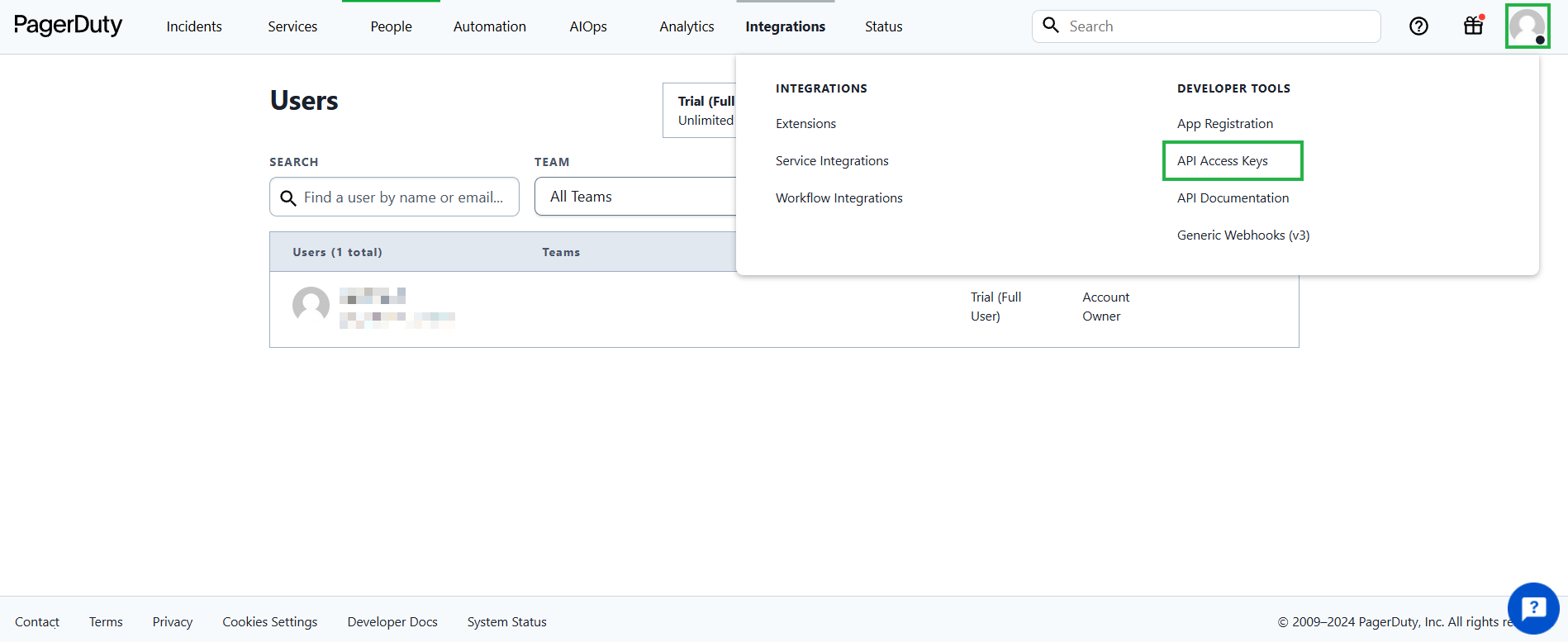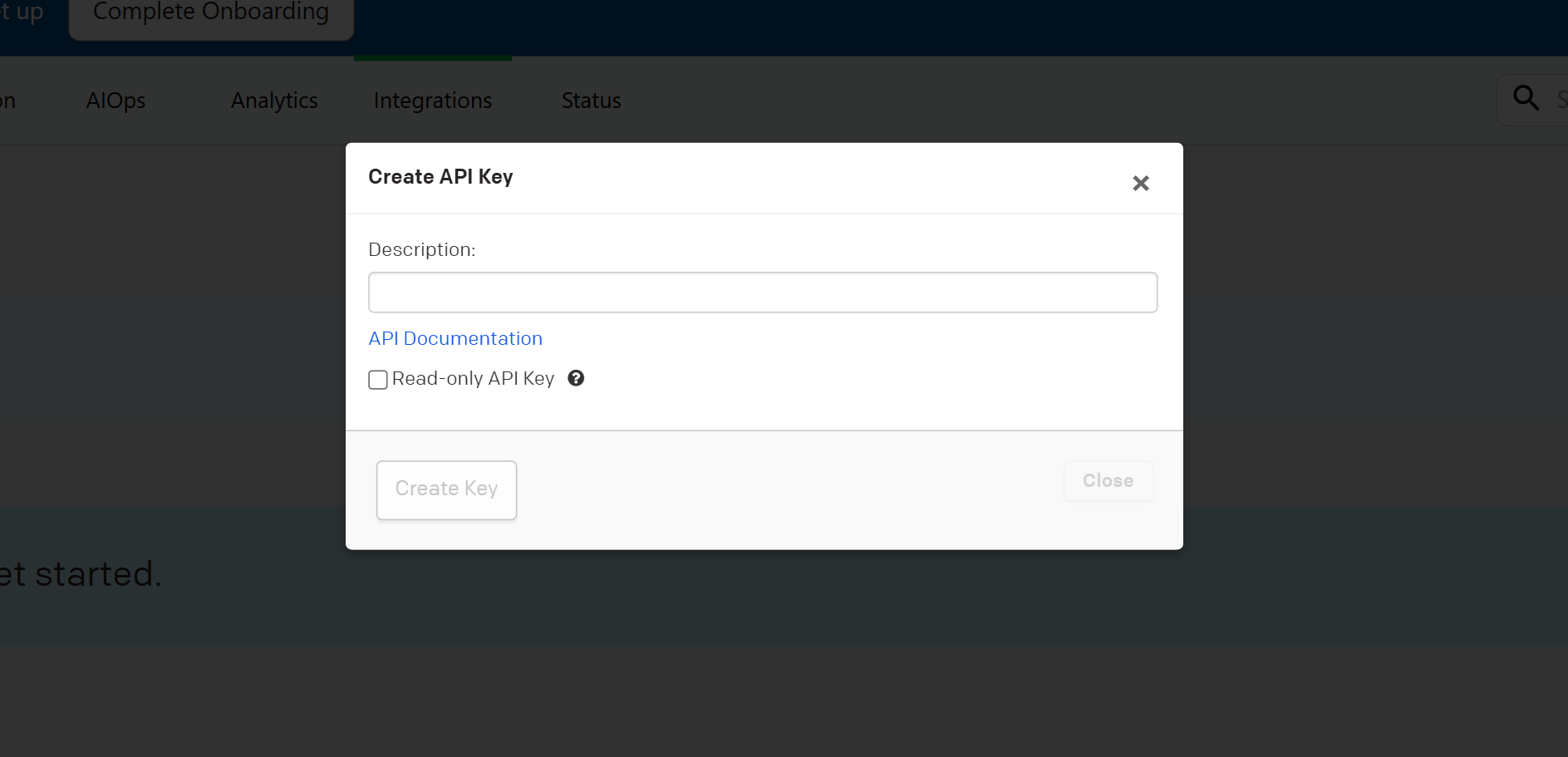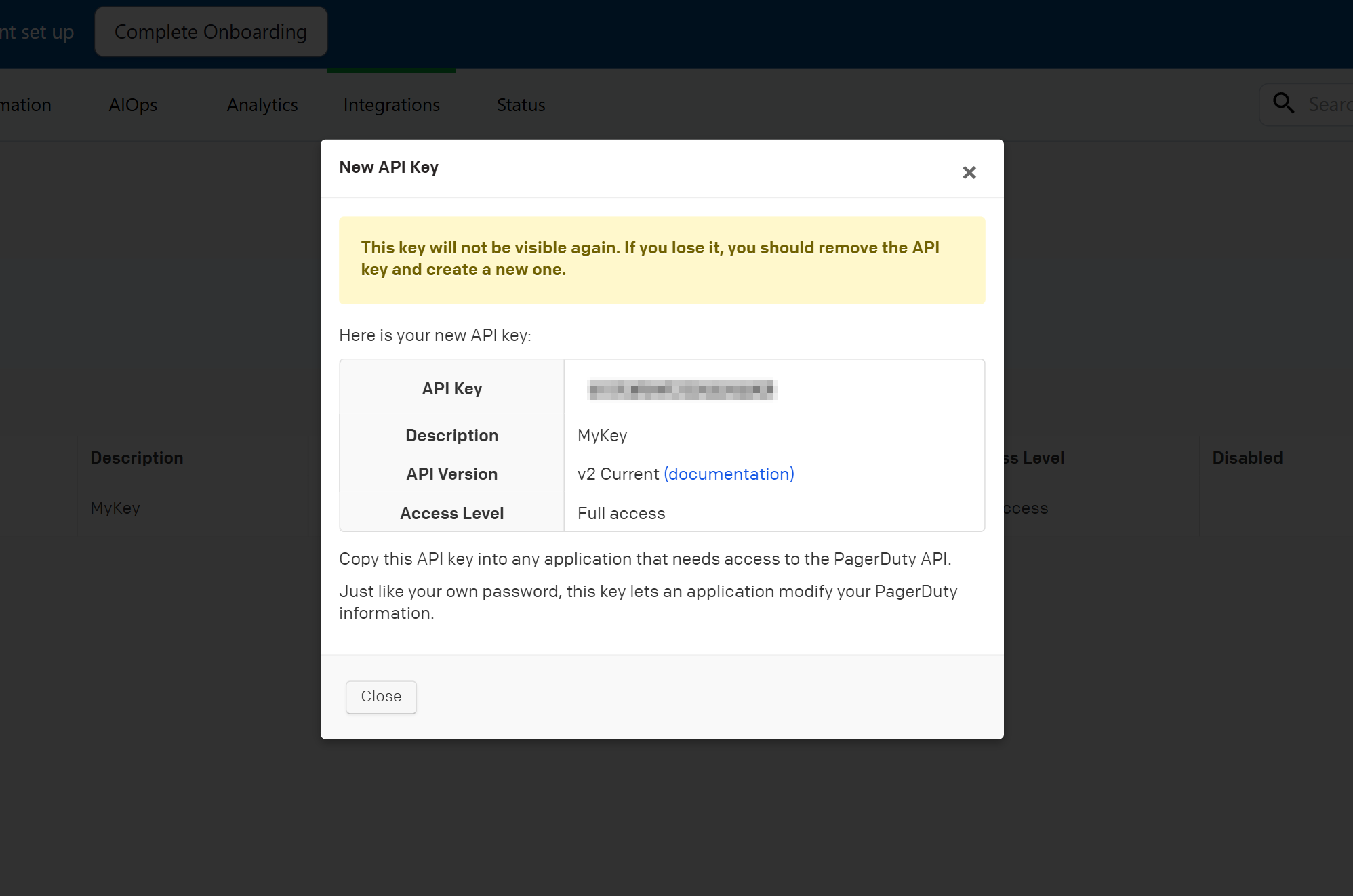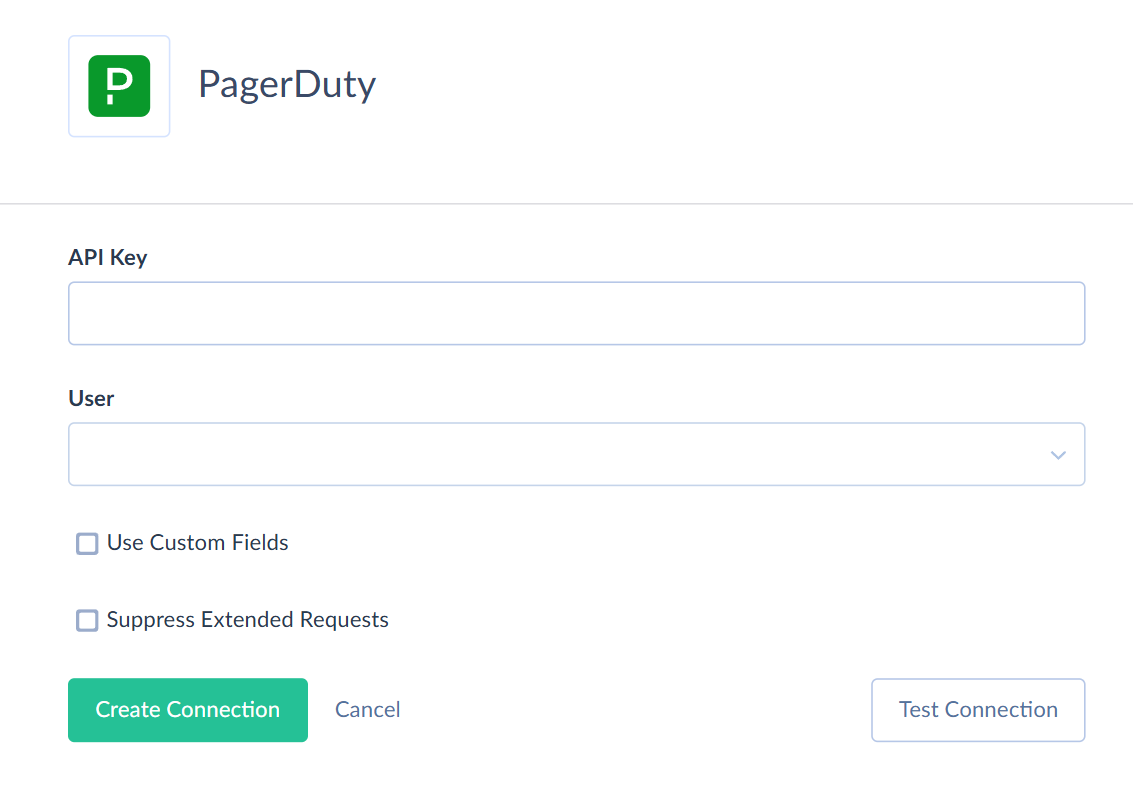PagerDuty
PagerDuty is a SaaS incident management platform designed to help businesses handle alerts, automate workflows, and notify teams about issues.
PagerDuty and Skyvia Integration Benefits
Skyvia supports importing data to and from PagerDuty, exporting PagerDuty data to CSV files, querying data from PagerDuty, replicating PagerDuty data to relational databases, and synchronizing PagerDuty data with other cloud apps and relational databases.
Skyvia Backup does not support PagerDuty.
Integration Walkthrough
To create a connection to PagerDuty, you will need an API Key.
In PagerDuty
To obtain the API Key, do the following:
-
Go to PagerDuty.
-
Click the user icon in the top right corner of the page.
-
Select API Access keys.

-
Click Create New API Key.

-
Enter the description and click Create Key.

In Skyvia
To connect to PagerDuty, specify the API Key and select the user from the drop-down list.

Additional Connection Parameters
Suppress Extended Requests
PagerDuty API returns only part of the fields for some objects when querying multiple records. Skyvia performs additional extended requests to query values of missing fields. Skyvia performs such API requests for each record of such object. However, this can decrease performance and significantly increase the number of API calls used.
The additional fields are the following:
| OBJECT | FIELD |
|---|---|
| IncidentWorkflows | Steps, Team_Id, Team_Type, Team_Summary, Team_Self, Team_HtmlUrl |
| Templates | TemplatedFields_EmailBody, TemplatedFields_EmailSubject, TemplatedFields_Message |
| Schedules | ScheduleLayers |
You can select the Suppress Extended Requests checkbox to reduce the number of API calls.
Connector Specifics
Object Peculiarities
Incidents
By default, this object displays records created for the last month when querying. To get data for a longer period, use filters by the CreatedDate field. If you use the > or >= operators, the records created from the CreatedDate till today will be selected. If you combine the < and > operators or the <= and >= operators, the specified period must not exceed 6 months. Otherwise, you get an error.
AuditRecords, ScheduleAuditRecords, ServiceAuditRecords, TeamAuditRecords, UserAuditRecords
By default, these objects display records created for the last 24 hours when querying. To get records for another period, use filters by the ExecutionTime field with >, >=, <, <=. If you use the > or >= operators, the records created from the ExecutionTime till today will be selected. The specified period must not exceed 31 days.
Notifications
By default, this object displays records created since 01.01.2009 when querying. To get records for another period, use filters by the StartedAt field. If you use the > or >= operators, the records created from the StartedAt till today will be selected. If you use the < or <= operators, the records created from 01.01.2009 till StartedAt will be selected.
ScheduleOverrides
By default, this object displays records created from 01.01.2009 to 01.01.2099 when querying. To get records for another period, use filters by the Since, or Until fields.
Users
The License_Id and License_Type fields return empty results when querying. These fields are used for import only. If you map the License_Id field in import, the License_Type must also be mapped.
Filtering Specifics
PagerDuty API supports the following native filters:
| Object | Operator | Field |
|---|---|---|
| Incidents | = |
Urgency, Status, IncidentKey |
>, >=, <, <= |
CreatedDate | |
| LogEntries | >, >=, <, <= |
CreatedDate |
| Notifications | >, >=, <, <= |
StartedAt |
| ScheduleOverrides | = |
Since, Until |
| ScheduleUsersOnCall | = |
Since, Until |
| AuditRecords, ScheduleAuditRecords, ServiceAuditRecords, TeamAuditRecords, UserAuditRecords | >, >=, <, <= |
ExecutionTime |
Use these filters to improve performance and save API calls. You can use filters with other fields or operators, but it may increase API call usage.
Custom Objects / Custom Fields
PagerDuty supports custom fields of the following types.
| PagerDuty Type | DbType |
|---|---|
| Text | String |
| Single Select | Enum, String |
| Multiple Select | MultiEnum, String |
| Tag | Array |
| Url | String |
| Checkbox | Boolean |
| Date Time | DateTime |
| Decimal | Decimal |
| Integer | Int64 |
Incremental Replication and Synchronization
Skyvia supports Replication with Incremental Updates for the AlertGroupingSettings, EventOrchestrations, IncidentAlerts, IncidentLogEntries, IncidentNotes, Incidents, IncidentWorkflowActions, IncidentWorkflows, IncidentCustomFields, LogEntries, Priorities, Services, Templates, and UserActiveSessions objects.
Replication tracks only new records for the following objects: UserActiveSessions, IncidentAlerts, IncidentNotes, IncidentLogEntries, IncidentWorkflows, IncidentWorkflowActions, LogEntries.
Skyvia supports Synchronization for the AlertGroupingSettings, EventOrchestrations, Services, Templates, Incidents, IncidentCustomFields objects.
DML Operations Support
| Operation | Object |
|---|---|
| INSERT, UPDATE, DELETE | Addons, AlertGroupingSettings, BusinessServices, EscalationPolicies, EventOrchestrations, Extensions, IncidentWorkflows, IncidentWorkflowTriggers, MaintenanceWindows, Services, Templates, UserContactMethods, UserNotificationRules, Users |
| INSERT, UPDATE | IncidentCustomFields, Incidents, Schedules |
| INSERT, DELETE | ScheduleOverrides, Tags, Teams |
| INSERT | BusinessServiceSubscribers, IncidentNotes, IncidentNotificationSubscribers |
| UPDATE | ChangeEvents, IncidentAlerts, Standards |
| DELETE | TeamMembers |
Stored Procedures
Skyvia represents part of the supported PagerDuty features as stored procedures. You can call a stored procedure, for example, as a text of the command in the ExecuteCommand action in a Target component of a Data Flow or in Query.
AddUserToTeam
To add a user with a specified role to a team, use the command
call AddUserToTeam(:team_id,:user_id,:role)
| PARAMETER NAME | DESCRIPTION |
|---|---|
| Team_id | Identifier of the team |
| User_id | Identifier of the user |
| Role | Name of the role. Valid values are observer, responder, manager |
RemoveBusinessServiceSubscriber
Use the following command to remove a record from the BusinessServiceSubscribers object.
call RemoveBusinessServiceSubscriber(:service_id,:subscriber_id,:subscriber_type)
RemoveNotificationSubscriber
The following command unsubscribes the matching Subscribers from Incident Status Update Notifications.
call RemoveNotificationSubscriber(:service_id,:subscriber_id,:subscriber_type)
Supported Actions
Skyvia supports all the common actions for PagerDuty.
Support
If you need help with this integration, please contact our support.